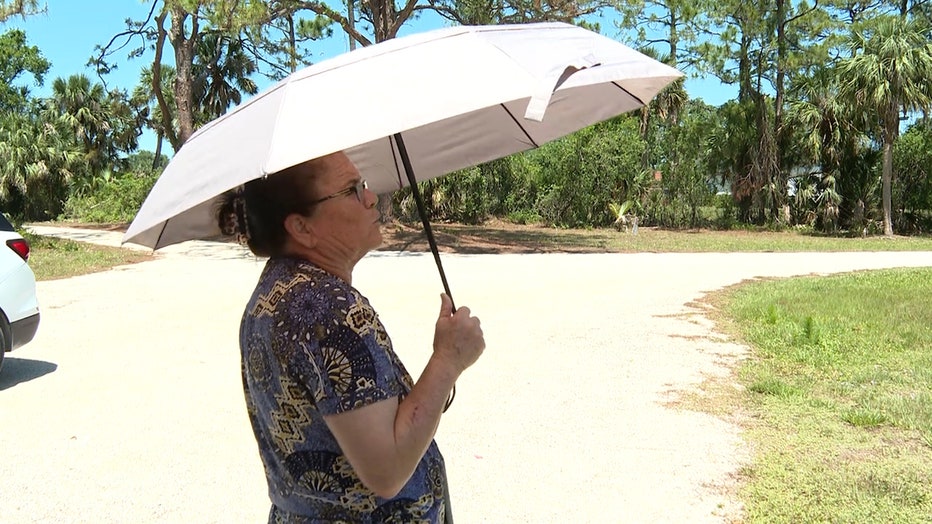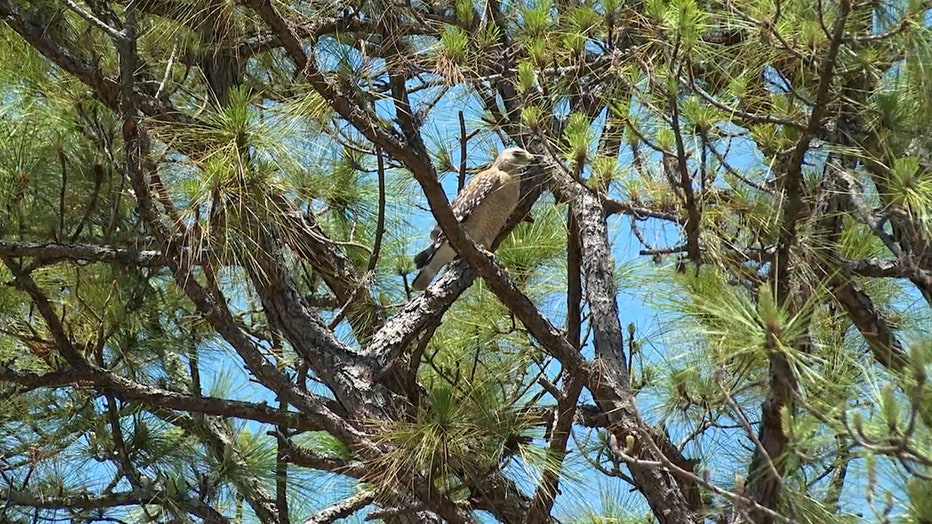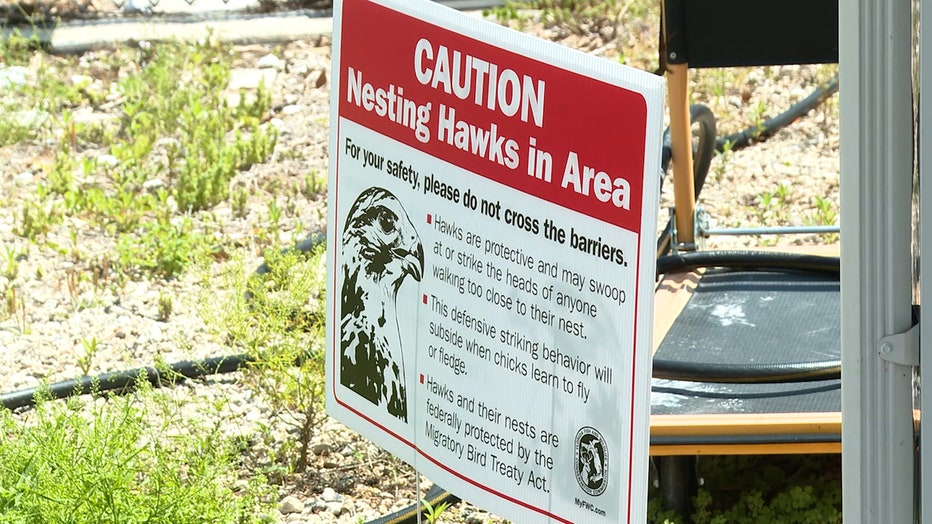Venice family being attacked by pair of hawks nesting outside their home
Woman shares video of aggressive hawks on property
FOX 13's Kimberly Kuizon shares one woman's story of aggressive hawks divebombing every time she or someone goes outside her house.
VENICE, Fla. - The phrase "heads up" has taken on a new meaning for a Venice resident and her family.
For the past year, they’ve been attacked by a pair of hawks who’ve set up a nest outside their home.
The backstory:
Odalys Hayes told FOX 13 she loves wildlife.
She’s had hawks on her property for years, but these are unlike any she’s encountered before. She’s asking for help from the state to give her peace.
"That’s the female, the female is very, very bold," said Hayes.
READ: Resilient SRQ replaces home damaged during Hurricane Ian, dozens more to follow
Hayes gets no peace.
"He’s coming," she shouted before a hawk swooped her.
She’s under attack from a pair of red-shouldered hawks, who’ve set up a nest on her Venice property.

Odalys Hayes says her family has no peace thanks to the pair of hawks.
Her only defense is her umbrella.
"This pair made a nest right in front of the property. Anytime we go to take the garbage out, which is a long way from the back of the house to here, they will attack us. Anything we do out, they will come and attack us," she told FOX 13.
Dig deeper:
It’s not just her family.
Her lawn guy, the water guy and even an FWC official have all been swooped by the hawks.
READ: Partnership offers horse therapy for Bay Area kids battling cancer
"Last year they cleared land near Venice and Havana, I don’t know if it has anything to do with it, but I’m assuming because that’s when the problem started," said Hayes.
Hayes is concerned for the safety of customers who come to her business on the site.

The red-shouldered hawks have attacked the family for the past year.
She’s contacted every agency from the FWC to the USDA.
"They’re really nice people. Don’t get me wrong. They’ve all been here. They’ve all been attacked. They can’t believe what I’m going through. But nobody can do anything, this is why I called you guys because I need help," she shared.
Hayes doesn’t want any harm to come to the hawks, but she wants to be able to enjoy her home. To be able to go out and do an Easter egg hunt with her granddaughter. Which right now, without an umbrella or a helmet, that’s not happening.
What they're saying:
Officials tried to remove the nest once, but the hawks came back and nested again.
Now there’s a sign in place, warning that hawks are federally protected under the Migratory Bird Treaty Act, leaving Hayes few, if any, options.

Officials have not been able to successfully relocate the hawks' nest.
"I’m not safe. I’m not safe at all, and we have a statue that stipulates if people are being hurt and property is damaged, these agencies are supposed to do something, but they can’t," she said.
Hayes said the only permit she can be issued is one to remove the chicks.
She said the hawks will remain and continue to nest.
FOX 13 has reached out to USDA, but have yet to hear back.
The FWC provided the following statement:
Staff with the FWC’s Wildlife Assistance Program have been working with the resident to help provide technical assistance and have provided guidance on ways to prevent conflicts with nesting hawks. Staff have also connected the resident with federal entities and provided guidance on how to apply for a federal permit if needed. All Florida birds of prey, including their nests and eggs, are protected under Florida law and the federal Migratory Bird Treaty Act: http://www.fws.gov/migratorybirds/RegulationsPolicies/mbta/mbtintro.html.
Owls, hawks and other birds of prey are nesting and raising chicks in spring and summer. Birds of prey will defend offspring from any perceived threats, which sometimes may include people or pets, repeatedly diving at you if they think you’re too close. Some tips to follow when dealing with aggression from protective nesting hawks and other birds of prey:
- Avoid areas near the nest, if possible. If you must go through the area, carry an open umbrella or wear a hard hat.
- Temporarily erect a shade structure to obstruct the birds’ view of people and pets.
- Planting shrubbery can also provide cover for pets and birds visiting feeders.
- Sometimes you may be able to use an air horn to deter birds that start to dive.
- During the non-breeding season, trim branches to eliminate perches and help resolve recurring issues.
- Eliminate attractants that may attract prey such as rodents into your yard. Items like unsecured garbage, fallen bird seed and pet food are common household attractants that may entice prey species that raptors eat onto your property.
Additional information on dealing with protective, nesting birds of prey can be found at: https://myfwc.com/license/wildlife/protected-wildlife-permits/raptors/ and https://myfwc.com/media/21806/living-with-raptors.pdf. We also have a video online that gives further guidance: https://vimeo.com/510827411. Residents needing more guidance or that have further questions are welcome to contact an FWC wildlife assistance biologist in their region: https://myfwc.com/contact/fwc-office/regional-offices/.
The Source: FOX 13's Kimberly Kuzion collected the information in this story.
STAY CONNECTED WITH FOX 13 TAMPA:
- Download the FOX Local app for your smart TV
- Download FOX Local mobile app: Apple | Android
- Download the FOX 13 News app for breaking news alerts, latest headlines
- Download the SkyTower Radar app
- Sign up for FOX 13’s daily newsletter

